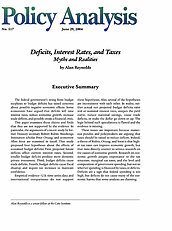This paper examines those claims and finds that they are not supported by the evidence. In particular, the arguments of a recent study by former Treasury secretary Robert Rubin, Brookings Institution scholar Peter Orszag, and economist Allen Sinai are examined in detail. That study proposed four hypotheses about the effects of sustained budget deficits: First, projected future deficits affect current interest rates. Second, smaller budget deficits produce more domestic private investment. Third, budget deficits cause trade deficits. Fourth, budget deficits cause fiscal disarray and require tax increases to maintain confidence.
Empirical evidence–U.S. time series data and international comparisons–do not support these hypotheses. Also, several of the hypotheses are inconsistent with each other. In reality, neither actual nor projected budget deficits raise real or nominal interest rates, steepen the yield curve, reduce national savings, cause trade deficits, or make the dollar go down or up. The logic behind such speculations is flawed and the evidence is missing.
These issues are important because numerous pundits and policymakers are arguing that taxes should be raised to reduce deficits. Indeed, a theme of Rubin, Orszag, and Sinai is that higher tax rates can improve economic growth, but that runs directly counter to serious research on the causes of economic growth. Research on economic growth assigns importance to the tax structure, marginal tax rates, and the level and composition of government spending, but not to whether spending is financed by taxes or deficits. Deficits are a sign that federal spending is too high, but deficits do not cause many of the economic harms that some analysts are claiming.


